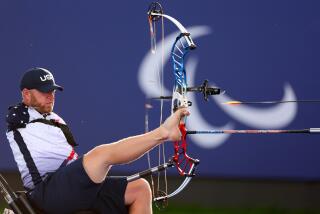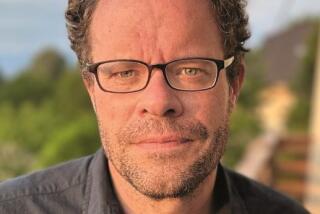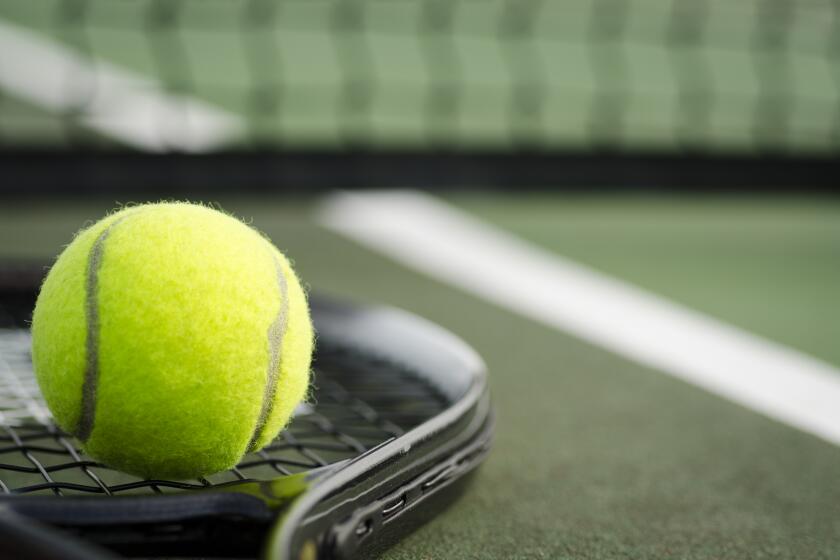Hearing impairment doesn’t stop these hockey players
- Share via
Trey Wilson can’t hear the crowd applaud when he scores a goal, and he has scored quite a few since he discovered hockey was a perfect outlet for his energy.
The 25-year-old left wing from Riverside was born deaf, which means he can’t hear the crunch of skates on ice or the shrill tweet of a referee’s whistle, sounds as integral to hockey as pucks and sticks.
To Wilson, not being able to hear isn’t a problem. It certainly hasn’t prevented him from excelling at the sport he took to naturally and without fear of being at a disadvantage.
“No, not at all,” he signed, with girlfriend Delaynee Watson interpreting. “I’ve always just kept my head up and passed the puck and made sure I’m aware of what’s going on.”
Wilson has always played on teams with players who can hear, and he transferred from Martin Luther King High — where he met Watson — to Valencia to play for the Valencia Flyers junior team. Communication problems meant he wasn’t always welcomed by teammates, but he never allowed himself to become discouraged.
“Sometimes they’re rough on me and sometimes they treat me as an equal,” he said, “because that’s just how hockey is.”
Hockey also has proved to be his ticket to a rare experience.
This weekend he will play for Team USA at the second World Deaf Ice Hockey Championships in Vantaa, Finland, under the umbrella of the American Hearing Impaired Hockey Assn. and USA Hockey. The 23 players range in age from 19 to 47, and all have hearing loss of at least 55 decibels in their “better” ear. Hearing aids or cochlear implants can’t be worn during competition. Many have played on mainstream teams, including goaltender Jeff Mansfield for Princeton and others at the Rochester Institute of Technology and club teams.
In this competition, as at the Deaflympics, strobe lights around the rink will flash to alert players to stoppages. The tournament starts Saturday and ends April 6.
“I’m so excited, no words can describe it,” Wilson said recently in Anaheim after meeting several Ducks after a morning skate. “I’m really looking forward to it.”
This will be Wilson’s first international championship. He didn’t make the 2007 Deaflympics team or the bronze-medal-winning 2009 world championship squad, and the 2011 Deaflympics were canceled after the chief organizer embezzled money that had been paid for hotel rooms. The loss of those funds still hurts: U.S. players for the first time were asked to pay their airfare to the team’s training camp in Albany, N.Y., to help defray estimated costs of $5,000 to $6,000 for the trip.
“If there’s guys that have problems, we can help them out,” said Coach Jeff Sauer, who won two NCAA men’s titles at the University of Wisconsin and now coaches the U.S. Deaf team and Paralympic sled hockey team.
“It’s a pretty expensive deal, and the fact that the last Olympics were canceled, we had quite a bit of money invested. We really haven’t recouped all of that for this trip.”
Sauer said he has known Wilson for about 15 years and coached him at the American Hearing Impaired Hockey Assn.’s annual June hockey school in the Chicago area. The organization was started by Hockey Hall of Famer Stan Mikita and Chicago businessman Irv Tiahnybik, and the camp in recent years has been led by former King Tony Granato, an assistant coach of the Pittsburgh Penguins.
Sauer has been involved with the school for nearly 35 years and has enjoyed seeing Wilson’s progress.
“He’s improved, made it through the tryouts and did an excellent job,” Sauer said. “I’m anxious to see how he will do in international competition. He’s been at our camps a number of times and he’s really developed as a player.”
Sauer said the team will have a sign-language interpreter on its bench to make communication easier. He has devised some signs related to hockey terminology that are easy to pick up.
“The thing about these kids is that they’re hockey players — they just can’t hear,” Sauer said. “They understand the game. They know when they’ve had a penalty or they know when they go offside, so that part of it is not the instruction part. The instruction part is to get them to play the systems that we want, the forechecking, and defensive zone coverage, and that type of thing.
“The biggest thing with them is as soon as we get them together there’s a tremendous chemistry. Most of them when they go home to play, they play on teams that are hearing. And they’re either put on the end of the bench or people ignore them because they’re intimidated or worried about the fact they can’t communicate. Whereas with us, everybody has got the same situation, and they grew together as a team very quickly. It’s really pretty easy.”
Wilson, who said he plans to return to school after the world championships and become a physical therapist, was too awed to ask the Ducks for hockey tips during his visit to Anaheim. But he said Bobby Ryan offered advice about the food in Finland.
“He said, ‘I hope you like fish with white sauce because you’ll eat a lot of that,’” Wilson said, smiling. “I just can’t wait.”
twitter.com/helenenothelen
More to Read
Go beyond the scoreboard
Get the latest on L.A.'s teams in the daily Sports Report newsletter.
You may occasionally receive promotional content from the Los Angeles Times.










